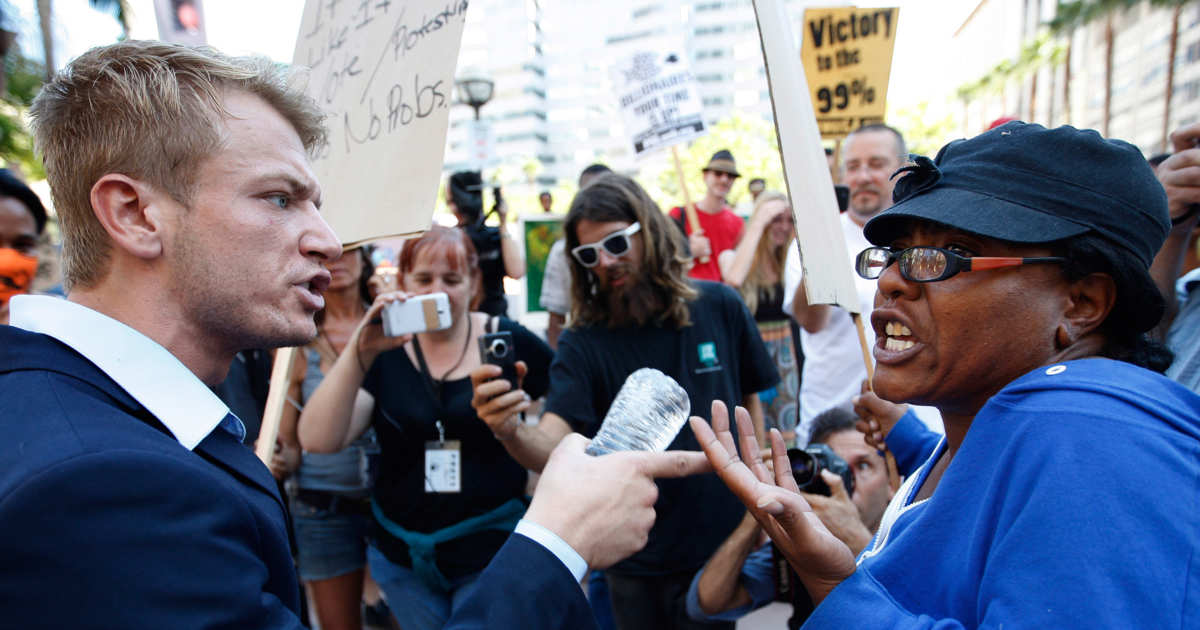“Hillary Clinton just seems out of touch,” many one-time Democratic voters (and now Donald Trump supporters) stated during the 2016 election and the months following, “she just doesn’t understand us Midwesterners.” On the other side in the months since the election: “This Trump Administration and party doesn’t understand the importance of women’s and minority rights.” The cycle rinses and repeats regularly, as severely disenfranchised populations of America loudly debate whether one party is too stuck in coastal elitism, or another doesn’t value the worth of women or minority races.
Each statement and argument get a little louder and more personal, each dispute a little more tense, and blood eventually boils. This process is nothing more than a loud and boisterous race to the bottom for American discourse, and has become a major threat against civility among our friends and family.
As I wrote last September, media saturation into our society has become far more dynamic and entrenched into the fabric of our everyday lives. As expected, I didn’t even take my own advice, as the campaign took its final turn to the finish line, and in the transitional period that has taken place since. The constant petty jabs about my candidate and the responses I made back to those jabs contributed to what has been this race to the bottom among my friends and family.
Virtually every talking point came from these media sources, and tension among those closest to me reached levels that should make everyone feel ashamed. A once proud and civil nation has turned petty, personal, and has painted everyone as one extreme or the other.
Donald Trump ran a successful 2016 presidential campaign which catered to voters in rust-belt and agricultural areas who feel politics and economics have surpassed them in the post-industrial age, personally disenfranchised by politicians they had voted for and supported for decades.
Many felt as though current Washington politicians were more worried about political correctness than job placement or overall economic vitality in these economically ravaged regions. Trump’s boisterous demeanor and willingness to speak his mind, whether politically correct or incorrect, captured the attention and support of these people as a voice to finally address their concerns on a loud enough stage.
Large numbers of these Donald Trump supporters, many former Democrats, or people who have never participated in the political process before, felt personally ignored by “coastal elites,” neglected and insulted by political discourse in America, and continued worsening of their livelihood. Election 2016 was their tipping point.

The culmination of these twists and turns in the race is an ever polarized, personally-insulted American population. People who were once friends or close family are now on two separate ends of a spectrum backed with emotional and personal investment, concerns, and anger of our current state.
“Well we wouldn’t have this issue if you didn’t support the devil for president,” a friend once told me, “you’re part of the problem.” People once identified by their quality traits or contributions to their community are now identified as “us” or “them,” no longer an individual, but part of a group who personally enabled a political process to take place which has personally impacted lives in a negative way, whether pre-2016 election or after.
Personal labels like snowflake, redneck, uneducated, or bible-thumper are now placed at a fever pitch across this nation, while once only murmured. Minorities are viewed as angry and bitter; women concerned about their healthcare choices are viewed as people without morals; middle class workers are viewed as insensitive to other viewpoints; refugees are viewed as nothing more than a dangerous threat. The labels and preconceived notions of all different groups are being perpetuated at the highest octane, only speeding up this nasty race.
The result of this race to the bottom is the splintering of families, friendships and workplaces across our country. People who were once personally close are simply annoyed, angered and enraged by personal attacks and insults to the point where they have shied away from people once closest to them, or worse, have retaliated against them with even worse attacks painting their counterpart in a bad light.
This race to the bottom is nearing completion; a finish line marked with no celebration, no positive feedback, and no ability to converse or debate the tough issues facing our nation. People who once debated or solved problems over a beer or a bite to eat no longer have that dinner date or night at the bar.
The issues linger and lead into places of employment, where people have less patience for their colleagues, and solutions are less likely to be found in a board room or conference call. These issues enter our places of worship and civic organizations, where suddenly a person’s morals or character is also at question, as though one political election defined their ability to be moral or immoral.
The race back up to the top won’t be determined by whether America is great again, or any other political slogan. This race back to the top will require two friends to grab that beer together again, without questioning hidden motives or evil intent, to talk through the issues of our time, and to reach logical solutions together as good and proud patriotic Americans. Donald Trump vs Hillary Clinton may have brought out our worst, but it doesn’t have to lower the ceiling of what our best can become.

